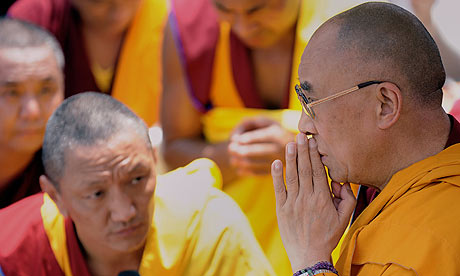
Thousands of angry protesters marched in China’s only Muslim-majority region today to demand government action over a series of hit-and-run syringe attacks blamed on the ethnic Uighur group.
The unrest is certain to unsettle the authorities, coming just weeks after angry Uighurs rampaged through the streets of the city of Urumqi in riots that left 197 dead in the worst violence in China in 50 years.
The Government will be desperate to calm tempers and restore order as the leaders in Beijing are preparing for the Communist Party’s biggest party in a decade to celebrate 60 years of party rule.
One resident of Urumqi said he saw a group of ethnic Han Chinese beating up a man from the Turkic-speaking Muslim Uighur minority, accusing him of being among those suspected of stabbing passers-by with syringes.
A Han Chinese man told The Times: “Thousands of people, maybe tens of thousands gathered in People’s Square today to protest. We don’t believe the Government is doing enough to protect us from these syringe attacks.”
The crowd chanted: “Useless government, useless government” as they milled for hours in the city’s main square.
The boss of the Xinjiang region, Wang Lequan, the Communist Party secretary, made his way to the square and took up a megaphone to appeal to the crowds to disperse quietly. His appearance further inflamed the protesters.
“Wang Lequan resign, Wang Lequan resign,” they shouted. Then another roar erupted. “Wang Lequan is a bastard.” The party secretary swiftly withdrew from the square. The crowd did then begin to thin out.
The party secretary is a hardliner who has governed the region with a grip of iron for 14 years. Many Uighurs, now accounting for less than half the population in a region where they were once in an overwhelming majority, chafe under Chinese rule and a tiny minority even dream of independence from Beijing.
The depth of ethnic tension was underscored by the latest reports of bizarre syringe attacks reported on the streets of Urumqi. Officials say people of all ethnic groups have been hurt and 15 people have been detained for the stabbings. They have given no figure for the number of injured nor a breakdown of their ethnic background.
Several people have been treated in hospital but there have been no reports that anyone has been seriously hurt. The China Daily website said no one had been infected or poisoned by the syringe stabbings.
The Han Chinese resident told The Times: “People are pretty nervous to go out on the streets now. Parents make sure that they accompany their children to and from school to protect them from this kind of attack.”
He said the Government had been too slow to respond. That complaint echoed those that followed the riot that raged through Urumqi on July 5 when angry Uighurs beat, stoned, stabbed and set fire to Han Chinese, killing well over 150 people. Others who died are believed to have been Uighurs killed in revenge attacks or rioters shot by paramilitary armed police.
Hospitals declined to give any details of those injured in the bizarre syringe stabbings. An official at the regional People’s Hospital said: “This is a secret matter. Only the government is authorised to give information.”
However, witnesses said groups of relatives of some of the injured had gathered outside the hospital to wait for news of their loved ones. They were described as extremely agitated.
Zhao Jianzhuang, a Han resident, said he had joined a large crowd of protesters who were being blocked by riot police from marching on central People's Square, less than 1 mile (1.6 km) away.
He said anger was stoked by a perceived delay in trials for those arrested after the July riot, as well as by the recent spate of stabbings. “There are so many security forces deployed here, yet they're incapable of protecting us.” link...


